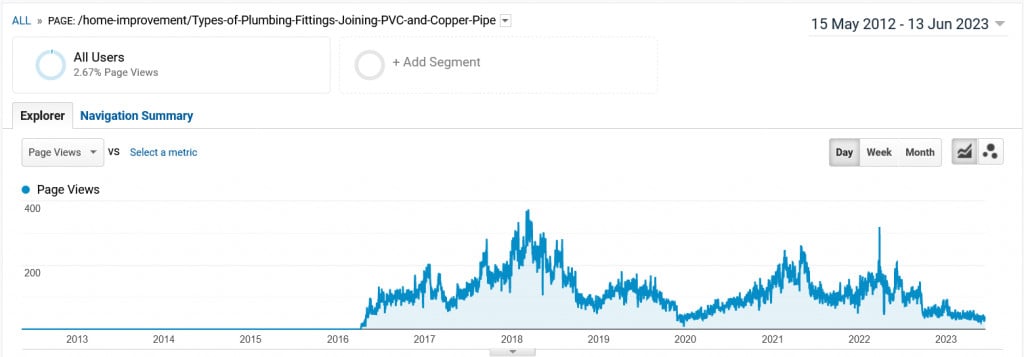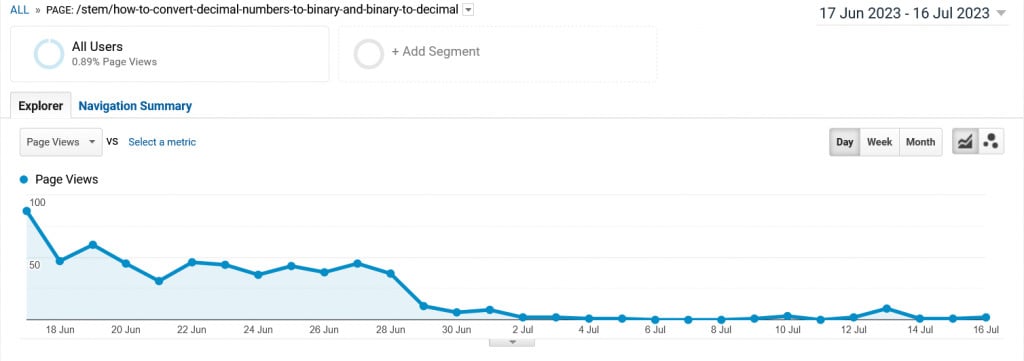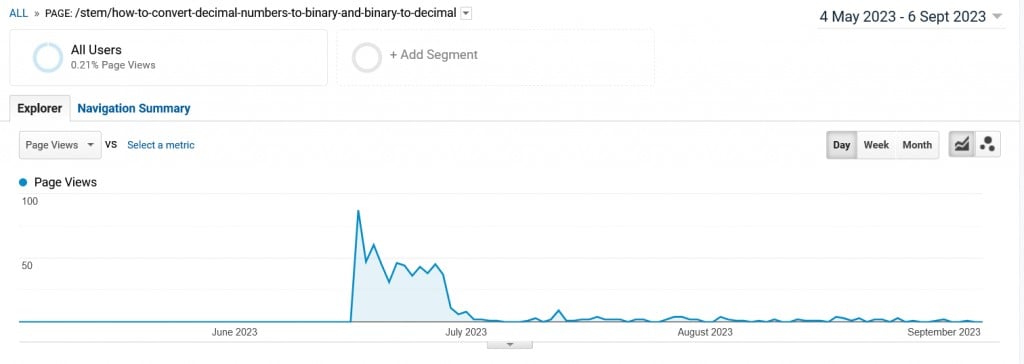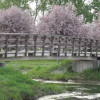I'm going to do a test republish of one article that used to get 1500 views peak for several months, settling to 200 to 300 depending on term time. Now it gets about 10 views per day.
This is the tutorial.
https://owlcation.com/stem/How-to-Conve … to-Decimal
Google only likes new stuff, there's no such thing as evergreen articles anymore and they only want the latest, freshest content as far as I can see, so I'll give them something new.
Eugene, do you mean delete and rewrite the article, with a new URL but generally the same content with edits/additions? And a new title?
Something like that. It's only getting about a dozen views a day compared to 1500 views per day peak (and that was after a few months). I've nothing to lose really. The content will be exactly the same, but I'll have to reword the title slightly different to generate a different URL.
Got it. Interesting way to test the Google. Might the content ("exactly the same") generate a copyright ding? If it does, I guess you could ignore it since it's your content.
URLs can (and often should) be modified when you initially create an article. 
Something to keep in mind if you do decide to delete and then republish this article.
I did unpublish and republish it on 16th June with a different title so it had a different URL. Then I reverted the title to what it was previously.
Will HP take action to halt the rapid decline in traffic across all niche sites due to TAG's ad and text layout which is undermining article status with each Google update?
janshares, I'm thinking the same way as you're.
Have you tried updating the article? I update all of my articles every January and have maintained my views.
I have over the years, but it's like an article for peeling an orange, there's only so much you can add. Similarly for a recipe article. You can't keep adding to it or it becomes a cookbook. My article just describes numbers and how to convert between bases. Trying to add more content would be like creating another topic around the subject, losing the simplicity of the tutorial and should really go into a new article.
By update, I mean rephrasing things for clarity or elegance, checking for spelling and grammatical errors, etc. Even small changes make Google happy.
4 months ago I would have agreed with this, "Google only likes new stuff, there's no such thing as evergreen articles anymore and they only want the latest, freshest content as far as I can see."
Since the editors went through many PetHelpful articles and updated the main photo, while pushing the original lead photo down in the article where appropriate, I have seen a boost in views and income. I went through and updated some of the content, and those articles have risen to the top of the list for highest views.
I have also noticed that The Spruce Pets is not as prominent in SERPs. So I am guessing that the latest Google update has made some sort of a change in how it determines the value of an article. Perhaps age and updates are in the running again. IDK.
I will be interested to see how your experiment goes.
Let us know the result of the test. Thanks.
I am very much looking forward to your updates about this.
It gave me error when I clicked the link: 404 Error. anyway, this is true. in the beginning i get thousands of views but slowly it fades out. So I just keep updating the content once a while. Like today I did a full refurbishment.
Don't use Chat GPT for your refurbishments... people are getting banned for using it.
I've done this a few times to mixed results. After deleting I let articles lie fallow for a few weeks to ensure they are de-indexed and don't trigger a plagiarism warning.
I might republish this one too. Several high traffic articles have lost up to 80% traffic this year.
OK, it's done. I unpublished the other one so I don't know what going to happen regarding duplicate content but I 'm not worrying about it. I asked Hubpages can they redirect traffic from external backlinks. If they can't, I'll contact websites and try to get them to edit links. The old version had half a million views, let's see how this performs.
Thanks! I think it's worth the experiment. There's some plagiarised versions out there that I'm trying to get removed, so I might have to resort to the Wayback Machine for the original publishing dates. However, I'll use the new version first and they mightn't notice the date.
Hubpages have moved the new version of the article to Owlcation and the link seems to have been indexed already by Google. Matt says they can't reroute traffic coming in to the old version, so I have to contact sites to get them to change backlinks.
I wish you well but I'm a bit skew-wobbled - do you now have two different versions of the same article indexed? Or is the old one defunct, gone, and the new one taking charge? Just how many backlinks will you have to reactivate?
I'm guessing you'd like the new (longer? better?) version to climb higher in the rankings?
If it performs well you're thinking about a gradual update of all your quality articles?
What if it climbs high initially then drops off?
In one sense you're crossing the border into Googleland again, this time as a new citizen with a slightly altered passport, with lots of attractive traits that the border guards (Al Gorhythm & Cor Update) wave you straight through.
I unpublished the old version, but I don't know how long it takes Google to deindex it. When I search for the URL, it doesn't appear in the SERPS.
I can't find any backlinks, maybe the ones I remember were to a different base conversion article. I don't know about republishing all articles, maybe another few that previously had high traffic. I don't know how much theses high traffic articles were earning. They fall into the STEM category and Paul Goodman said that it's not a lucrative area as regards earning. I'll bribe Al and Cor if I've any problems.
The de-indexing usually took place after 24 hours period I suppose. But as to the wobbles you're facing, I'm a dumb-ass to them...I'm not even computer savvy with such issues. THanks.
Is this something new? On another related article, the article is turning up in a slide show of Owlcation articles in the title video at the top of the article.
I'm going to revert the title to what it was originally too. I had to add in the word "number" temporarily to change the URL. Possibly it would be of benefit as a keyword but I don't think people add "number" to a base when they search.
So it's ranking in 86th place in SERPS, compared to 1st place and then 0th place as a featured snippet shortly after the original version was first published. Maybe it'll rise or it's just that the reputation of Owlcation is so bad that Google won't place it higher at the moment.
I wonder how the ranking is determined. The niche sites like Owlcation and others may not be the most reader-friendly, but, in many cases, they are still better than some of the other sites you see on page one in ranking.
Ranking is based on lots of factors including quality of content, "user experience" and the number of backlinks from other reputable sites. The algorithm from what I can make out is still pretty much useless at determining quality and that's why it still surfaces thin content to the top of SERPS, often just because it's on websites belonging to "reputable" companies. The fact that they've brought out a new feedback form to report spammy, low quality or deceptive sites suggests that either the algorithm can't detect these attributes or they're outsourcing the work to us.
https://hubpages.com/community/forum/35 … dback-form
It very much seems like they are outsourcing the work to us. That's why I am not much impressed with this feedback form. It's not our task to determine what's high or low-quality content. The algorithm should be "clever" enough to prevent low-quality content from ranking high.
It seems to be have been removed from SERPS today for the same search term.
Only 3 organic search results so far, and I think they're referral spam because the time on site was zero. Not very promising, but it's early days. For some reason I've never understood, it takes time for traffic to ramp up for new articles. It's as though Google does some sort of timesharing indexing thing with keywords on the billions of webpages on the Net.
Overall, good try, Eugene. I admire your hutzpah in standing up to Google. I'll start calling you "David."
Ha Ha, they keep chipping bits off us, so I'll keep pelting them with stones.
Still only 3 organic results. The original version took around 8 days to start getting organic views which rose to 1500 per day a year later.
They seem to have downranked it now and the only way it shows up is if the whole title is searched for.
So I guess the lesson learned is that republishing isn't the best strategy. At least not now.
That may be. But the long time results can varied.
2 to 3 organic search results per day so far after 10 days.
This is the trend for the original article.
The full title of this article has now been totally removed from SERPS whatever that means.
Whatever that means? Google, is terrible these days. Some here will not agree.
I agree with the fact that Google is a mess nowadays.
oh eck, ecky thump.
Something not right here. Each article is being vampirised slowly but surely. Killed by bad ads and split text.
What to do? There is zero communication from staff. Nothing. What sort of people are running the show? They hide, they edit at random, they keep schtum.
Remember the days of Samantha Cubbison and her lengthy messages to us all? Two years ago we were told bold and brave new things. Now look at the stats. Something rotten in the state of Denmark....
Recall the days when the odd article could get thousands of views overnight, and hundreds guaranteed daily for some?
And the earnings!! My God. We worked hard for good money. That one day in autumn 2019 when everything peaked and I reached a three figure sum. Will we ever return to the good old days? Perhaps not.
But as authors we surely have a right to know officially what TAG plans for the future? Why don't they come clean? It's just plain nuts. The lifeblood is draining yet there's no reaction, no action, no remedy.
And the madness is I've just published a new article!! And now want to start another. I enjoy writing. I love what I do. We're still getting paid but for how much longer?
I have a fantasy: TAG will invite Matt Wells and his editor team to buy back HP and that Matt Wells will then offer crowdfunding to all the authors for a complete revamp of the niche sites. This is our only hope?
I have a theory that Google ranks webpages on the amount of CO2 they generate and the amount of power they require to display. Network site articles are the only webpages that I've come across that seriously overwork my machine because of all the ads, bringing the temperature of the processors up to 80 degrees and the cooling fans go mad. Another likelihood is that since there are so many ads, and images don't display until the ads are finished, readers are just backing out because they can't take the whitespace. I cant read network site articles anymore on my phone because they take so long to load. A minute to load is way over people's attention span.
I hope someone from TAG with business sense reads your lines Eugene although I rather suspect that we're two lone voices in a long dark ethereal echo chamber.
I also want a change. Even though I've not been here for as long as you guys, I still put in a lot of effort and free time to make this happen, yet the traffic never really picks up, and when it does, it's a random spike that disappears into the void.
Your experience is common to many, even the old 'guys' here.
I tried to read one of my articles and the ads are overwhelming. The article is about local words translated to English so the article itself is not heavy on paragraphs or sentences hence, the article looked messy ![]()
The ads are driving me crazy as a reader.
The latest twist in the saga is that when I search for text from the article, Google doesn't show it. However they show a result in the SERPs for the version on Medium. However I set a canonical link to the newly published version on Owlcation.
Still hardly any traffic, three views on Monday, none on Tuesday. something tells me Google is penalising it for some reason. It doesn't turn up in Bing or Google for fragments of the title.
Did you use the same images in the republished version as in the initial one, or have you changed them? I think that could have something to do with it, but it's a plain guess from my side.
After a month still no organic views. There are some reported by GA, but the time on page is zero, so they're likely referral spam.
I suppose that's it for that particular article. So editing without republishing still seems the way to go, even though it doesn't give much better results.
I've posed the question about low search traffic on the Google support forum and it was suggested by someone that the reason it's not performing well is because the "site lacks the topical authority in the niche (computer science) that article falls into". This raises the question again of the network sites being too general as regards the collection of topics they group together on each site and whether some of them need to be broken up again into new sites with less topics to improve authority. This article I republished is about number bases, so I think of it as math. I wonder should I get it moved to Turbofuture?
Most sites are too general these days, and it's a sad trend. Many niche sites and magazines have either died out or remain in hibernation, with no awakening in sight.
I highly doubt we will get more niche sites. It would require more editors, and companies nowadays kick out more people than they hire, especially these days.
Owlcation is a large site. Maybe it could be split up into a site for the arts and one for the sciences or maybe another for education. Dengarden could be split up into a site for gardening and another for home improvement. It's probably more of an IT job, splitting sites, rather than work for editors.
True, Owlcation would benefit from splitting up. It's also one of the sites that seems to struggle the most currently.
Whatever about the ads, it's probably lack of EEAT that's responsible for the big drop-off in traffic over the last couple of years.
Yes, although Google's EEAT is a (deliberately) vague concept open to wide interpretation.
If ads were the primary culprit, all the niches would be equally affected. Some niches are doing okay, even if most are in the soup.
HP have been forced to completely rethink their linking strategy but interlinking articles will take forever, even with editors working hard on it.
I've requested that this article be moved to Turbofuture. If they move it and it does better, I'll get another one that very similar moved too. Traffic is still only a couple of views a day. One organic view registered a time on page, so maybe that's a start.
Could the fact that my new article has the same title as my old article and the new title is the same as the text at the end of the old article's URL be why this isn't getting any traffic?
I asked for some help on the Google Support forum and this was the reply. One person suggested that what I did has confused search engines because they remember the content, but it's no longer associated with the same URL, which now 404s.
https://support.google.com/webmasters/t … 225536072#
Someone else suggests redirecting traffic from the old URL to the new one, but Matt says this isn't possible.
The forum suggests Owlcation has poor crawlability. Another complaint is that it has lots of links pointing to pages that have been deleted.
Interestingly, this means Owlcation is not reliable.
This issue is right up Matt Wells street is it not?
I confess that I'm not a techy person, but considering this information, will a sort of "clean up" (it that's even a thing) help the site's ranking, and traffic subsequently?
I agree with Kenna. This give an impression that the site is not reliable.
(I'm speculating on this) No matter how many credible sources we use on our articles, it might not matter if the site itself is being viewed as not credible due to such broken links.
Why can't the edit team delete them? They should be notified about those, right? I struggle to understand why this isn't dealt with already.
Are you referring to me? Actually all links and ads were broken. Images also needed some work due to size incompatibility. Also added few lines here and there to increase word count. Some few touches that’s all. And ah I deleted some of the outdated topics.
As long as you don't add AI-generated text, you'll be fine. HubPages is using an AI filter now.
If you aren't seeing replies direct to your posts, go to the top of the page and click 'chronological'.
Hope that helps.
I just checked and this article is in eight place when the whole ten word title is searched for. That's bad isn't it?
It's far from ideal, that's for sure. I hope there's work behind the scenes to ensure our articles rank better.
When I search for a string of text from the article, Google lists the Medium version (which has a canonical link, so that wasn't much use and I deleted the article). It also lists a malicious site. It doesn't show my tutorial I select the option to show "entries very similar to the 2 already displayed".
I believe what you're demonstrating here is that republishing doesn't work.
If it were shown that republishing worked, the consequences would be enormous. It would be in the interests of writers and publishers everywhere to regularly delete and republish their articles in order to gain favor with Google.
I just don't see Google as seeing that scenario as desirable, and I don't think they're incompetent enough to do it accidentally.
While I try to maintain an open mind, republishing just seems like a simple solution that's too good to be true.
I think that "newness" is just one factor that the Google algorithm considers out of many and it's almost certainly not as important as quality backlinks.
I'm talking about general articles here. With news, Google takes a different approach, as there's intrinsic value in news articles being current.
I think there has been an adjustment to the "newness" criteria. Adding fresh images to old content seems to have worked for a couple of months, so far. The effect may be tapering off already.
I tried an experiment last week and tweaked the title of an article of mine that had been copied several times. It no longer looked any different than the rest of the things out there but still was on the front page. Anyway, when I changed the title a little to make it stand out from the others it moved back up to over 1000 page views a day on Sunday.
Not sure it is going to last, just like changing those images you mention. I am going to try and alter a few more this week and see if the changes have any effect, or if that was just an outlier.
So basically, changing the title could mean that the search engine perceives it as a whole new article.
I don't think that it perceives as a whole new article, but if Google is respecting age on evergreen articles again, and you make a change, it may refresh it over the competition. Until they make a perceptible change and Google pushes you down.
I dont think so, as it still has the same backlinks and other things that identifies it as an article. I just changed it to make it stand out a little from the paraprhased copies, some of which had my exact same (old) title.
I recently made title changes on a few articles and have noticed a rise in views.
That's terrific. Sometimes I change titles and lose views lol.
This one was already on the front page and I do not think it changed page rank. (Spruce pets and one other site is ranked above it.) I was hoping it would not lose page rank, which would make it lose views.
I saw something strange today; I don't think I have seen before. I have an old article on Greek Myth dog names. Another user has posted Greek Dog names.
In the SERPS his is listed around #4 and mine is indented beneath his, as though it were a subset of his article. Has anyone seen that before?
Needless to say it is no longer one of my best performing articles. Not for a long time.
I have seen that when I search Pethelpful articles and find two on the same subject. Was that a paraphrased copy of your original Greek Myth dog names article?
I've seen it a few different times over the last year. Google does this for sites that have two or more articles with relevant material, where the other pages do not rank on the first page. In most instances I've personally seen, the pages are related, but they answer slightly different questions. I doubt Google has specific rules for how indented results work, but I think interlinking between pages helps.
Yes, slightly different questions answered- One is Greek names and mine is Greek God names. So myth vs. Greek common names.
Edit: Apparently Google views Greek as synonymous with Greek Myth, which I think is sort of weird. A specific search for Greek God or Greek Myth brings up Greek in the #2 spot.
One thing that occurred to me was that nowadays I have way more articles that get very low or zero views, far more than in the past.
Meantime, HP are moving articles with low views out of niches and into Discover.
One wonders where that's all going to lead. Presumably, fewer and fewer articles in the niches.
I mean, some moves I agree with and I understand the importance of editing. But there are times when I feel like it's just a very crude approach.
Rank or die seems to be the modern motto.
I agree. Ideally, and more diplomatically, the procedure would be a warning with suggestions for keeping the articles in the niches.
Currently, I am asking an editor questions about two demoted articles. I figure, why not ask and get HP editors to do a little work instead of a form letter that talks about typos and grammar, which has nothing to do with either of the demotions?
To be fair, most of their decisions regarding moves seem reasonable, given the wider context of falling traffic overall. And if the article is easily saveable, they will often tell you what you need to do.
However, with, say, Rupert's work, I'm unconvinced that a niche suffers in any way due to the quality of the article. It's likely getting low traffic due to the subject matter or lack of SEO promotion. That's not the same as Google punishing the niche.
Anyway, I don't have any great solutions. It just means that we have to get lots of traffic for everything. That necessarily constricts what you can write about and how you write it.
They offer a quick sentence after the form letter: Kenna if you... I do make the corrections. Before demotion, they should tell us what is "saveable" about the article. If editors helped more in this fashion, I speculate that traffic overall would be better. I've worked in this industry for decades. Editors and writers need to work as a team. It pays in dividends.
HP could establish a probation period for the writer to fix the article based on the editor's solid suggestions. If the changes aren't met, then demotion. It just seems backward or disheartening to demote the article first. Then, tell the writer we've moved your article (it sucks) and good luck trying to get it back to the niche.
Still nothing much happening with this. One or two views per day or zero some days.
Maybe it's early days yet. It took quite a while for the original to reach 1200 peak daily views.
I'm still only getting one or two views per day after republishing. Should it take this long for Google to understand that the original no longer exists? It was unpublished and disappeared from search months ago.
It seems as if some articles can get views from Google right away, while some take weeks or even months. It's an utter mystery for me.
I asked the team several times over the last couple of months to move the article to Turbofuture and haven't got a reply, so I'm going to republish it again and suggest Turbofuture as the destination, once it's featured. I want to try breaking the link with Owlcation because obviously the search algorithm has a problem coping with the fact that the original was republished.
I'm still only getting one view per day on average to this guide.
It seems to me that the one or two views per day, are manually enginnered?
by Eugene Brennan 2 years ago
Some guides that used to get 40 views per day, now only get a few views per week. I've nothing to lose really by republishing
by youssefdoukkali 6 years ago
Are we allowed to republish our articles elsewhere and keep the original hubs here in the mean time?
by Jo Miller 7 years ago
If I unpublish an article here, can I republish it on another site?
by rachel carpenter 11 years ago
Hi! I'm excited to be here!I'll be honest I currently have a deep, dark foggy cloud surrounding me........... as I learned today that Yahoo Voices is closing. I am devastated and honestly in a complete shock. I have over 1000 articles published on there.I will start writing my NEW content...
by Steve Andrews 13 years ago
What a mess! I unpublished and deleted a hub that was idled. I used the Webmaster's Removal Tool to make sure it was deleted from Google too and thought great, I am now free to publish again at InfoBarrel but I was wrong. It was denied!I set about searching for the first paragraph of my work and...
by Thomas Swan 3 years ago
In the last few months, I've spent a long time updating all of my network hubs, improving the language and flow, breaking up the text, getting better pictures, fixing links, adding more recent research, updating stats, titles, descriptions, etc. My traffic across these 100 or so hubs seems to have...
Copyright © 2026 The Arena Media Brands, LLC and respective content providers on this website. HubPages® is a registered trademark of The Arena Platform, Inc. Other product and company names shown may be trademarks of their respective owners. The Arena Media Brands, LLC and respective content providers to this website may receive compensation for some links to products and services on this website.
Copyright © 2026 Maven Media Brands, LLC and respective owners.
As a user in the EEA, your approval is needed on a few things. To provide a better website experience, hubpages.com uses cookies (and other similar technologies) and may collect, process, and share personal data. Please choose which areas of our service you consent to our doing so.
For more information on managing or withdrawing consents and how we handle data, visit our Privacy Policy at: https://corp.maven.io/privacy-policy
Show Details| Necessary | |
|---|---|
| HubPages Device ID | This is used to identify particular browsers or devices when the access the service, and is used for security reasons. |
| Login | This is necessary to sign in to the HubPages Service. |
| Google Recaptcha | This is used to prevent bots and spam. (Privacy Policy) |
| Akismet | This is used to detect comment spam. (Privacy Policy) |
| HubPages Google Analytics | This is used to provide data on traffic to our website, all personally identifyable data is anonymized. (Privacy Policy) |
| HubPages Traffic Pixel | This is used to collect data on traffic to articles and other pages on our site. Unless you are signed in to a HubPages account, all personally identifiable information is anonymized. |
| Amazon Web Services | This is a cloud services platform that we used to host our service. (Privacy Policy) |
| Cloudflare | This is a cloud CDN service that we use to efficiently deliver files required for our service to operate such as javascript, cascading style sheets, images, and videos. (Privacy Policy) |
| Google Hosted Libraries | Javascript software libraries such as jQuery are loaded at endpoints on the googleapis.com or gstatic.com domains, for performance and efficiency reasons. (Privacy Policy) |
| Features | |
|---|---|
| Google Custom Search | This is feature allows you to search the site. (Privacy Policy) |
| Google Maps | Some articles have Google Maps embedded in them. (Privacy Policy) |
| Google Charts | This is used to display charts and graphs on articles and the author center. (Privacy Policy) |
| Google AdSense Host API | This service allows you to sign up for or associate a Google AdSense account with HubPages, so that you can earn money from ads on your articles. No data is shared unless you engage with this feature. (Privacy Policy) |
| Google YouTube | Some articles have YouTube videos embedded in them. (Privacy Policy) |
| Vimeo | Some articles have Vimeo videos embedded in them. (Privacy Policy) |
| Paypal | This is used for a registered author who enrolls in the HubPages Earnings program and requests to be paid via PayPal. No data is shared with Paypal unless you engage with this feature. (Privacy Policy) |
| Facebook Login | You can use this to streamline signing up for, or signing in to your Hubpages account. No data is shared with Facebook unless you engage with this feature. (Privacy Policy) |
| Maven | This supports the Maven widget and search functionality. (Privacy Policy) |
| Marketing | |
|---|---|
| Google AdSense | This is an ad network. (Privacy Policy) |
| Google DoubleClick | Google provides ad serving technology and runs an ad network. (Privacy Policy) |
| Index Exchange | This is an ad network. (Privacy Policy) |
| Sovrn | This is an ad network. (Privacy Policy) |
| Facebook Ads | This is an ad network. (Privacy Policy) |
| Amazon Unified Ad Marketplace | This is an ad network. (Privacy Policy) |
| AppNexus | This is an ad network. (Privacy Policy) |
| Openx | This is an ad network. (Privacy Policy) |
| Rubicon Project | This is an ad network. (Privacy Policy) |
| TripleLift | This is an ad network. (Privacy Policy) |
| Say Media | We partner with Say Media to deliver ad campaigns on our sites. (Privacy Policy) |
| Remarketing Pixels | We may use remarketing pixels from advertising networks such as Google AdWords, Bing Ads, and Facebook in order to advertise the HubPages Service to people that have visited our sites. |
| Conversion Tracking Pixels | We may use conversion tracking pixels from advertising networks such as Google AdWords, Bing Ads, and Facebook in order to identify when an advertisement has successfully resulted in the desired action, such as signing up for the HubPages Service or publishing an article on the HubPages Service. |
| Statistics | |
|---|---|
| Author Google Analytics | This is used to provide traffic data and reports to the authors of articles on the HubPages Service. (Privacy Policy) |
| Comscore | ComScore is a media measurement and analytics company providing marketing data and analytics to enterprises, media and advertising agencies, and publishers. Non-consent will result in ComScore only processing obfuscated personal data. (Privacy Policy) |
| Amazon Tracking Pixel | Some articles display amazon products as part of the Amazon Affiliate program, this pixel provides traffic statistics for those products (Privacy Policy) |
| Clicksco | This is a data management platform studying reader behavior (Privacy Policy) |















